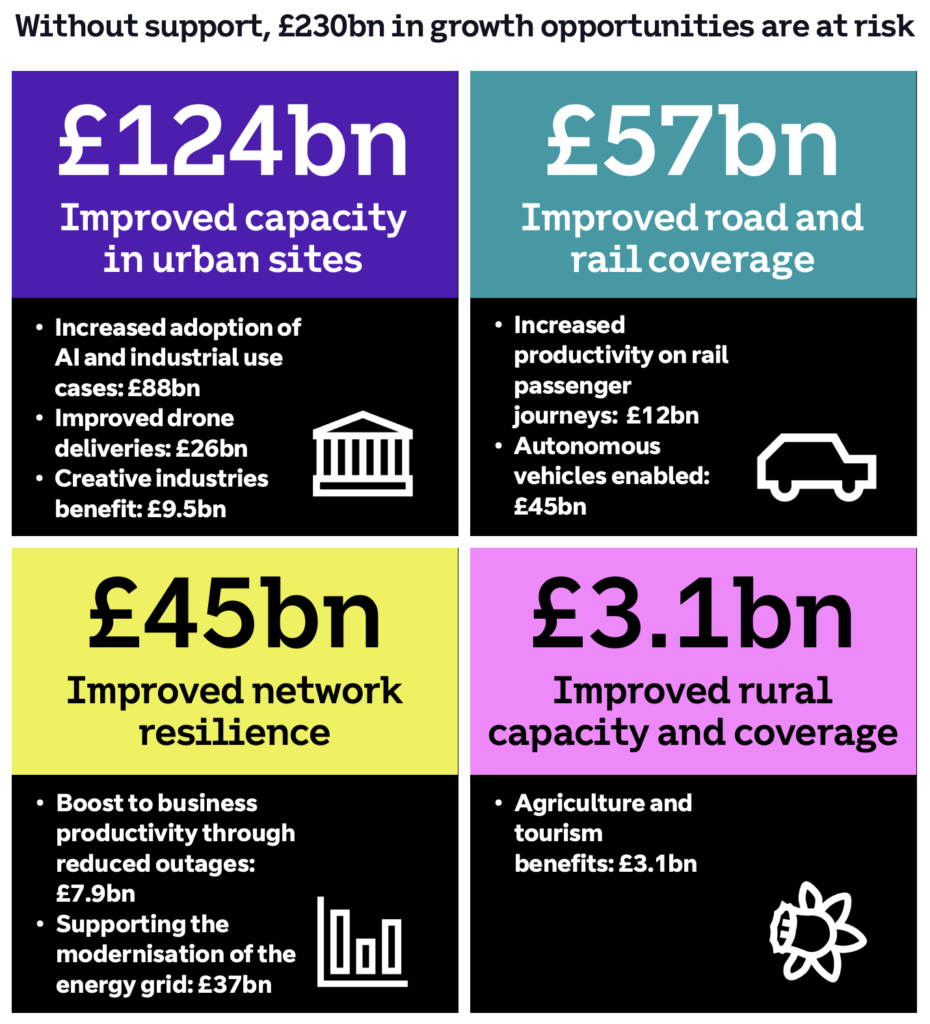This is the main conclusion from a new BT report – the problem is customers think they are paying for reliable total coverage now, although it’s not what they get
A new study published by BT Group concluded that delivering a highly resilient, nationwide high-capacity mobile network could unlock up to £230 billion (€265.5 billion) in economic benefits by 2035. It would also contribute a range of social and environmental benefits for the UK.
Mobile services are not ostensibly sold to customers as best effort, yet globally areas of poor or no terrestrial mobile service is driving a whole new sector – device-to-device (D2D) with satellite services filling in the gaps or providing route diversity. It is telling that this year, in the US, 1.8 million people signed up for a beta trail by T-Mobile of D2D communications (or as Americans call it, direct-to-cell or D2C), driven by the desire for universal coverage.
How government policy could help
The report calls for UK Government to support accelerated mobile network deployment by reforming planning laws and significantly increasing the availability of spectrum to ensure consumers and businesses have access to the best possible mobile networks and to underpin UK economic growth and innovation.
In fairness to BT and the other mobile operators, the Electronic Communications Code (ECC) which came into force in 2017 has not been a great success from the operators’ point of view. The aim was make it quicker, cheaper and easier for operators roll out broadband and mobile networks by simplifying procedures for obtaining access to sites and reducing delays caused by lengthy negotiations or disputes.
Spectral vision
Regarding spectrum, the report says that a total of about 1.1 GHz of spectrum is available for national mobile services – but the Department for Science, Innovation and Technology should work towards doubling this, for example, by “a rapid opening up of the 3.8-4.2 GHz, upper 6 GHz and 600 MHz spectrum bands – which could be used more efficiently by mobile operators to improve coverage and capacity, deliver rail coverage improvements and support future 6G requirements.
BT argues this would drive real growth opportunities, highlighting the GSMA’s estimate that 300 MHz of spectrum at 3.8–4.1GHz would be worth up to £3 billion for national mobile operators and lead to a £4.6 billion increase in GDP. BT report also states that access to 600MHz could reduce the costs of 5G deployment in rural areas by up to 30%. Access to these spectrum bands would also enable operators to boost network capacity in high density areas.
Here’s BT case of the upside of these policies at a glance.

Standalone supplement
BT’s Driving Growth: The £230bn Opportunity of Improved Mobile Networks report, developed in collaboration with Assembly Research, found that improved 5G standalone (5GSA) coverage could enable more than £88 billion in economic growth through the industrial adoption of new technologies like AI and machine learning. The report references network slicing and dedicated capacity.
Areas of poor coverage highlighted by the report include roads and railways. Total coverage of these transport arteries could provide another £12 billion of economic benefit by 2035, the report says. Also, autonomous vehicles – one of the great new developments we were promised that 5G would deliver almost a decade ago – could generate another £45 billion.
Although this isn’t just along railway lines where mobile operators can struggle to gain permission to place base stations. I have never managed to get online with what is described as the UK’s best network at Kings Cross station in London, regardless of time of day. Likewise, CityFibre’s David Tomalin complained about similar frustrations he experiences every working day at Waterloo, another huge railway station in London where multiple rail and Tube lines intersect.
Watch Tomalin’s interview on The real impacts of network optimisation from Mobile Europe’s recent Digital Telco virtual conference here.
Interestingly, the report does not mention how poor mobile coverage is within buildings in general or what steps are needed to fix it, or the cost, which ultimately will be paid by customers.
Town and countryside alike
The report goes on to claim that the rural economy could gain £3 billion by 2035 if only the countryside had reliable coverage with sufficient bandwidth while built up areas could potentially generate £88 billion growth from new technologies.
In the same timeframe, the report suggests another £9.5 billion could be unlocked for the UK’s broadcast, digital advertising and consumer media sectors.
Drones are not all good news
5GSA coverage could enable as much as £26 billion of added economic value from accelerated drone adoption by 2035, according to the report.
There is no mention of what drones could cost in terms of nuisance (invading privacy, noise pollution, causing accidents). Although there are rules about flying drones issued by the Civil Aviation Authority, a drone came within 10m-20m of colliding with a Boeing 737 airliner on its approach to Gatwick Airport in April. In the same month, a police helicopter was forced to abandon a mission when the pilot reported coming dangerously close to a drone.
In 2019, the UK’s Ministry of Defence launched a £2 million competition for proposals to tackle the future threats of Unmanned Aerial Systems (UAS).
Mobile backup
The findings also highlight that, if more reliable UK mobile networks were available, increased use of mobile backup options could become more attractive for some businesses. Doubling the take up of these options would result in recovery of about £7.9 billion in productivity as a result of reduced down time. The research also shows a further £37bn of benefits could be unlocked through supporting the modernisation of the energy grid.
Existing research about the potential benefits of improved mobile networks for health, education and workplace safety are in the BT report.
Howard Watson, Chief Security and Networks Officer, BT Group said, “We’re proud to be the biggest investor in the UK’s networks, having spent billions in the last five years to deliver improved connectivity for communities in every corner of the UK. But the way we use mobile connectivity is evolving, and as the demands on network capacity increase and retail pricing remains comparatively low, greater support is needed to unlock more private sector investment.
“To deliver the networks the nation needs for the future, we need greater collaboration with the government and regulator, as well as support from local communities and councils – so that everyone in the UK can reap the life-changing benefits connectivity brings. Reforming planning laws and opening up spectrum access would help accelerate the deployment of these critical networks.
This report proves that delivering secure, reliable and powerful mobile networks brings enormous value to consumers and businesses, fuelling the UK economy.”
Matthew Howett, Founder & CEO, Assembly Research, said, “Our modelling suggests the UK stands to gain as much as £230bn in economic benefit from more advanced, resilient and widely available mobile coverage. Improved mobile connectivity supports increased productivity on rail journeys, reduced downtime from outages and the adoption of a range of emerging technologies. As the Government continues to work on executing its agenda for economic growth, our modelling shows that investment in mobile connectivity delivers significant benefits across the whole of the UK.”




